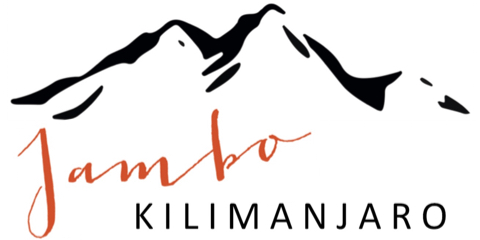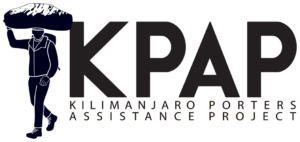7- or 8-day ascent of Mount Kilimanjaro
Lemosho Route is the longest and most varied route for tourists up to Uhuru Peak and offers fascinating views of the country over and over. You can choose between a shorter (7 days) and longer (8 days) ascent. You will spend a total of 9 or 10 days in Tanzania, respectively.
With us you can book Lemosho Route as an individual tour (please request a quote) or as a group tour at a favourable group rate.
Diverse nature with astonishing views
Lemosho Route is extremely varied and offers a partly untouched landscape as well as a varied flora and fauna. The route includes some steep passages. During the ascent you often have excellent views of Mt. Meru, west of Kilimanjaro, and Kenya.
You use different ways for ascent and descent. On the campsites along the route you sleep in tents. All campsites are in direct radio contact with the management of the national park. The number of visitors on this route is comparatively low.
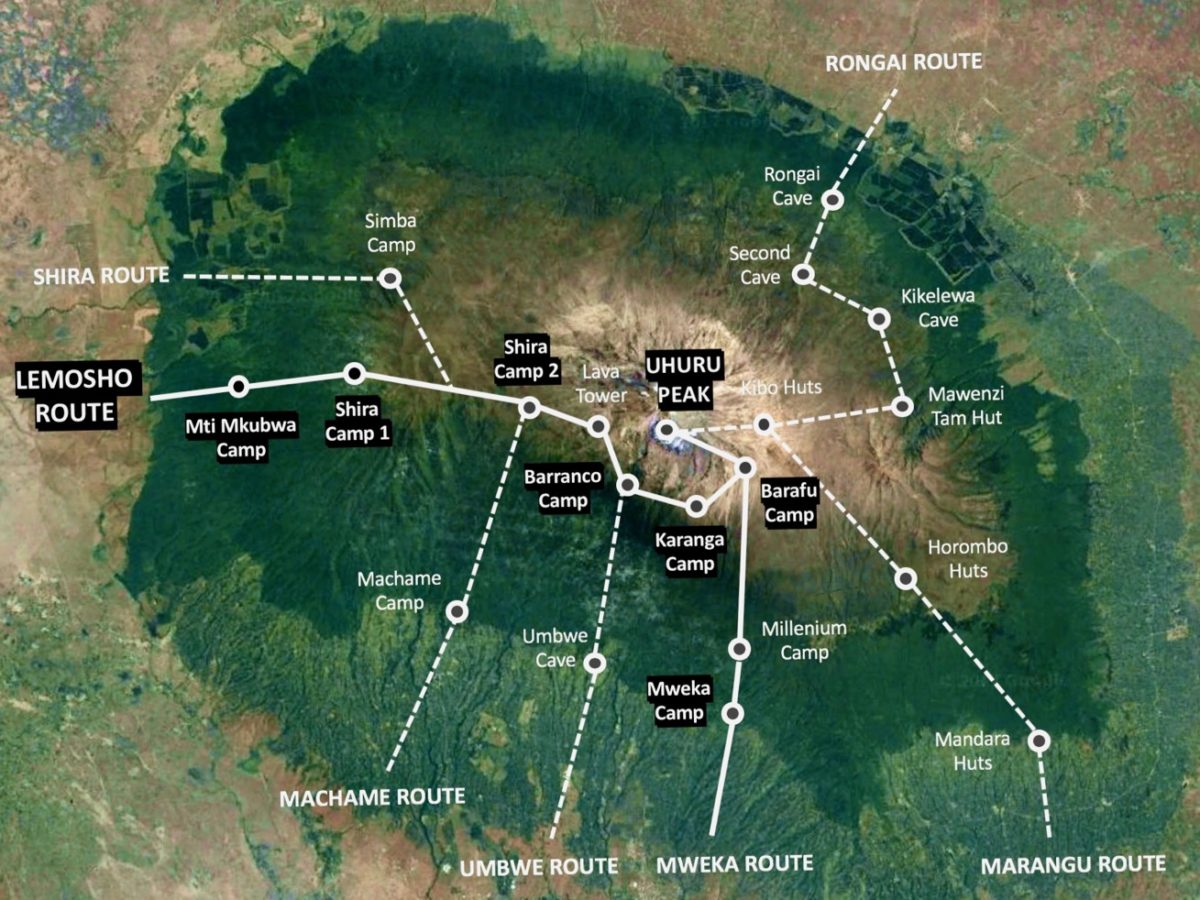
Our travel proposal
Day 1: Kilimanjaro Airport – Moshi
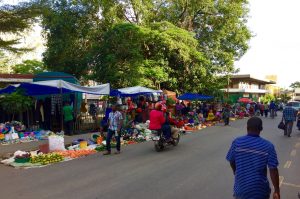 Welcome to Tanzania! Upon arrival at Kilimanjaro International Airport, you will be welcomed by your driver. Together you drive in the direction of Moshi (about 60 minutes drive). You are already expected at Chanya Lodge, which is located in a quiet area close to the centre of the small town. Upon arrival at the lodge, a detailed briefing and equipment check will be held, i.e. you get important information for climbing Kilimanjaro during the upcoming days. The afternoon is at your free disposal and can be used, for example, to explore the place or relax by the pool. Dinner takes place at the lodge, but can optionally be placed at another location (own organization necessary).
Welcome to Tanzania! Upon arrival at Kilimanjaro International Airport, you will be welcomed by your driver. Together you drive in the direction of Moshi (about 60 minutes drive). You are already expected at Chanya Lodge, which is located in a quiet area close to the centre of the small town. Upon arrival at the lodge, a detailed briefing and equipment check will be held, i.e. you get important information for climbing Kilimanjaro during the upcoming days. The afternoon is at your free disposal and can be used, for example, to explore the place or relax by the pool. Dinner takes place at the lodge, but can optionally be placed at another location (own organization necessary).
Day 2: Moshi – Londorossi Gate (2,200 m) – Mti Mkubwa Camp (2,750 m)
Hiking time: 3-4 h | Distance: approx. 10 km | Altitude difference: approx. 650 m ↑ and 150 m ↓ | Effort: Moderat
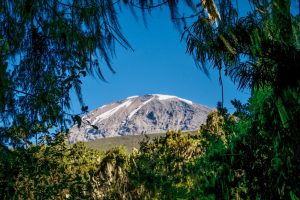 After a big breakfast at your lodge, your guide picks you up. He checks the luggage once more before you drive together to Londorossi Gate, the western entrance of Kilimanjaro National Park. Luggage not required during the climb can be stored at the lodge free of charge. For an overview of the topic “luggage on Mount Kilimanjaro” look here or here. After about an hour’s drive, you will reach Londorossi Gate at about 2,100 meters altitude. There, you will be registered by your guide in the national park. In addition, final preparations are made, such as baggage loading. Afterwards, you continue for about an hour by car (depending on weather and road conditions) until you reach the Lemosho Glades.
After a big breakfast at your lodge, your guide picks you up. He checks the luggage once more before you drive together to Londorossi Gate, the western entrance of Kilimanjaro National Park. Luggage not required during the climb can be stored at the lodge free of charge. For an overview of the topic “luggage on Mount Kilimanjaro” look here or here. After about an hour’s drive, you will reach Londorossi Gate at about 2,100 meters altitude. There, you will be registered by your guide in the national park. In addition, final preparations are made, such as baggage loading. Afterwards, you continue for about an hour by car (depending on weather and road conditions) until you reach the Lemosho Glades.
You then start your first leg on the mountain. It leads on paths through dense rainforest. You will discover a variety of plant species and with a bit of luck, you will see various wild animals such as antelopes, diademed monkeys and colobus monkeys. During the hike you take short breaks from time to time. After about 3-4 hours you will reach the first camp of your trip, the Mti Mkubwa Camp. The remaining time until dinner is at your free disposal. After dinner, your guide will give you tips regarding clothing for the night as well as regarding clothes to wear and day luggage to pack for the day ahead. At around 9 pm the first day at Kilimanjaro ends and you spend the first night in tents.
Day 3: Mti Mkubwa Camp (2,750 m) – Shira (1) Camp (3,500 m)
Hiking time: 5-6 h | Distance: approx. 8 km | Altitude difference: approx. 750 m ↑ | Effort: Moderat
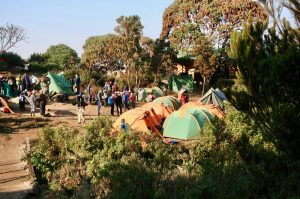 Your day begins with a big breakfast, weather permitting, outside your tent. At 8:30 to 9:00 am your hike will start in the direction of Shira (1) Camp. At the beginning of today’s stage, you still walk through dense mountain rainforest. After a short while, however, the forest begins to thin out. You have arrived at the edge of the heathland and moorland. Your hike will take you along an increasingly steep trail up to the Shira Plateau. You continue your hike across the plateau towards Kibo. During your hike, you have great views of Kibo and Mount Meru. Finally, you reach Shira (1) Camp, from where you can well see the western crater rim of Kibo, called “Western Breach”. If you choose the shorter of the hikes possible, you just take a break at Shira 1 Camp and continue the same day until the Shira (2) Camp. Otherwise, you spend the second night in tents.
Your day begins with a big breakfast, weather permitting, outside your tent. At 8:30 to 9:00 am your hike will start in the direction of Shira (1) Camp. At the beginning of today’s stage, you still walk through dense mountain rainforest. After a short while, however, the forest begins to thin out. You have arrived at the edge of the heathland and moorland. Your hike will take you along an increasingly steep trail up to the Shira Plateau. You continue your hike across the plateau towards Kibo. During your hike, you have great views of Kibo and Mount Meru. Finally, you reach Shira (1) Camp, from where you can well see the western crater rim of Kibo, called “Western Breach”. If you choose the shorter of the hikes possible, you just take a break at Shira 1 Camp and continue the same day until the Shira (2) Camp. Otherwise, you spend the second night in tents.
Day 4: Shira (1) Camp (3,500 m) – Shira (2) Camp (3,750 m)
Hiking time: 6-7 h | Distance: approx. 12 km | Altitude difference: approx. 400 m ↑ | Effort: Moderat
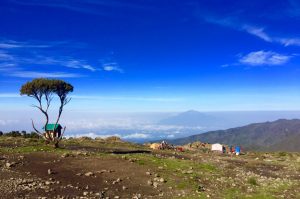 After breakfast, you continue your hike towards Shira (2) Camp. This day also serves as the first acclimatization day. There are several routes that lead to the Shira (2) Camp. Thus, depending on your constitution, together with your guide you can choose the route that suits you best. As on the previous day, today’s hike is shorter, however, the duration depends on the chosen route. During today’s leg you will once more have magnificent views of the Kibo massif. Because Shira (2) Camp is higher and less sheltered than the previous camp, temperatures can already fall below freezing at night. Here you spend your third night in tents.
After breakfast, you continue your hike towards Shira (2) Camp. This day also serves as the first acclimatization day. There are several routes that lead to the Shira (2) Camp. Thus, depending on your constitution, together with your guide you can choose the route that suits you best. As on the previous day, today’s hike is shorter, however, the duration depends on the chosen route. During today’s leg you will once more have magnificent views of the Kibo massif. Because Shira (2) Camp is higher and less sheltered than the previous camp, temperatures can already fall below freezing at night. Here you spend your third night in tents.
Day 5: Shira (2) Camp (3,750 m) – Barranco Camp (3,900 m)
Hiking time: 6-7 h | Distance: approx. 10 km | Altitude difference: approx. 850 m ↑ and 700 m ↓ | Effort: Increased
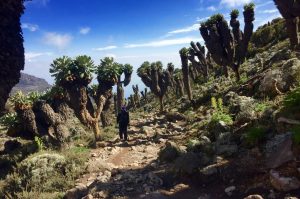 This day serves as an acclimatization day. After breakfast, the path leads steadily uphill for a long time. By now you have arrived in the stone desert. You walk up to Lava Tower at 4,600 meters where you have lunch. Right after, you start your decent over scree and stone, which is initially quite steep. Shortly before reaching Barranco Camp you have great views of the southern glaciers of Kibo. The path is lined with centuries-old crested trees (Senecia) and lobelia. In the afternoon, you will reach the camp where your mountain team will be waiting for you with tea, coffee and snacks. After dinner, your guide will give you the daily briefing for the coming night and the following day. At Barranco Camp, you spend your third night in tents.
This day serves as an acclimatization day. After breakfast, the path leads steadily uphill for a long time. By now you have arrived in the stone desert. You walk up to Lava Tower at 4,600 meters where you have lunch. Right after, you start your decent over scree and stone, which is initially quite steep. Shortly before reaching Barranco Camp you have great views of the southern glaciers of Kibo. The path is lined with centuries-old crested trees (Senecia) and lobelia. In the afternoon, you will reach the camp where your mountain team will be waiting for you with tea, coffee and snacks. After dinner, your guide will give you the daily briefing for the coming night and the following day. At Barranco Camp, you spend your third night in tents.
Day 6: Barranco Camp (3,900 m) – Karanga Camp (3,995 m)
Hiking time: 3-4 h | Distance: approx. 4 km | Altitude difference: approx. 200 m ↑ and 100 m ↓ | Effort: Moderat
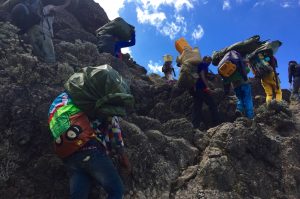 After breakfast, and soon after leaving the camp, a path leads up steeply the so-called Barranco Wall. Once you arrive at the top you have outstanding views. From there, the path continues along the southern slope of Kibo. Alpine arid landscape is characteristic for this region, and boulders of volcanic origin line the way. As before, you take short breaks every now and then. Shortly before reaching the next camp, the path leads several hundred meters downhill, and then back up again. After about 3 hours you will reach Karanga Camp. There you will have lunch. The afternoon is at your free disposal. At Karanga Camp you spend your fifth night in tents.
After breakfast, and soon after leaving the camp, a path leads up steeply the so-called Barranco Wall. Once you arrive at the top you have outstanding views. From there, the path continues along the southern slope of Kibo. Alpine arid landscape is characteristic for this region, and boulders of volcanic origin line the way. As before, you take short breaks every now and then. Shortly before reaching the next camp, the path leads several hundred meters downhill, and then back up again. After about 3 hours you will reach Karanga Camp. There you will have lunch. The afternoon is at your free disposal. At Karanga Camp you spend your fifth night in tents.
Day 7: Karanga Camp (3,995 m) – Barafu Camp (4,673 m)
Hiking time: 3-4 h | Distance: approx. 4 km | Altitude difference: approx. 680 m ↑ | Effort: Moderat
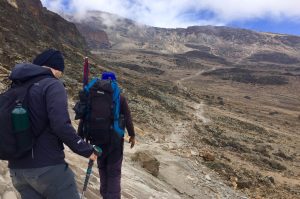
As on the previous day, today’s hike is shorter and only takes about 3-4 hours. The route runs, like the previous day, through alpine desert with light ups and downs. Only the last few meters before reaching Barafu Camp, you walk steeply uphill. You arrive at the base camp already around noon, and have the rest of the day at your free disposal (we recommend you take it easy and relax). In addition to lunch and afternoon snack, there is an early dinner, as your fifth night is very short and you start the summit climb in the middle of the night.
Day 8: Barafu Camp (4,673 m) – Uhuru Peak (5,895 m) – Mweka Camp (3,100 m)
Hiking time: 11-13 h | Distance: approx. 19 km | Altitude difference: approx. 1,230 m ↑ and 2,800 m ↓ | Effort: High
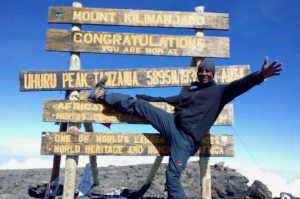 Here we go! At midnight, your trek up to the highest point of Africa, Uhuru Peak, begins. You zigzag your way through the darkness and cold, over scree and stone up the mountain. It is an impressive hike under great starry skies, provided the view is clear. After about 5 hours hike you reach Stella Point at an altitude of 5,756 meters. Depending on your speed, you’ll see a glorious sunrise here or later at Uhuru Peak. From Stella Point it is only around another hour to walk along the crater rim until you reach the summit. Once there, you can admire the impressive glaciers of Kibo, and simply enjoy the view. You made it!
Here we go! At midnight, your trek up to the highest point of Africa, Uhuru Peak, begins. You zigzag your way through the darkness and cold, over scree and stone up the mountain. It is an impressive hike under great starry skies, provided the view is clear. After about 5 hours hike you reach Stella Point at an altitude of 5,756 meters. Depending on your speed, you’ll see a glorious sunrise here or later at Uhuru Peak. From Stella Point it is only around another hour to walk along the crater rim until you reach the summit. Once there, you can admire the impressive glaciers of Kibo, and simply enjoy the view. You made it!
Then you return to the base camp. There you have breakfast and then continue your hike to the last camp of your journey. The path leads steadily downhill. The vegetation is becoming increasingly lush again. In the afternoon, you will reach Mweka Camp, where the mood among the travelers is usually good and relaxed, and you have time think about your impressive journey again. After dinner, you spend your sixth and last night at the campsite, surrounded by trees.
Day 9: Mweka Camp (3,100 m) – Mweka Gate (1,640 m) – Moshi
Hiking time: 2-3 h | Distance: approx. 10 km | Altitude difference: approx. 1,460 m ↓ | Effort: Low
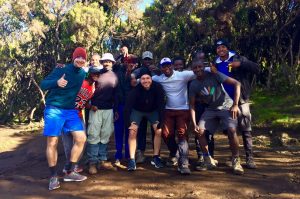 The last day of your hike starts with a relaxed breakfast. Today’s leg to the exit of the national park is only a few hours long. Before departure from Mweka Camp, the traditional farewell ceremony takes place. You walk through the lush green, as on the first day, and take short breaks from time to time. Once you arrive at Mweka Gate, your summit certificate will be issued, and you say goodbye to the mountain and your team. On the way back to your lodge you can stop for lunch. Once you arrive back at your accommodation – enjoy the shower! The rest of the day is at your disposal. Celebrate it the way you want, you deserve it! You’re spending the last night of your trip in your lodge in Moshi.
The last day of your hike starts with a relaxed breakfast. Today’s leg to the exit of the national park is only a few hours long. Before departure from Mweka Camp, the traditional farewell ceremony takes place. You walk through the lush green, as on the first day, and take short breaks from time to time. Once you arrive at Mweka Gate, your summit certificate will be issued, and you say goodbye to the mountain and your team. On the way back to your lodge you can stop for lunch. Once you arrive back at your accommodation – enjoy the shower! The rest of the day is at your disposal. Celebrate it the way you want, you deserve it! You’re spending the last night of your trip in your lodge in Moshi.
Day 10: Moshi – Kilimanjaro Airport
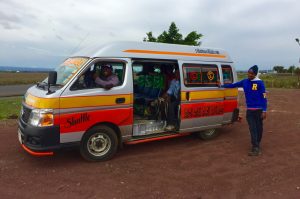 After a good night’s sleep and a big breakfast, you check out of the lodge. If you have planned further activities, you continue your individual travel program accordingly. Alternatively, your driver will drive you to Kilimanjaro International Airport and you will start your journey home.
After a good night’s sleep and a big breakfast, you check out of the lodge. If you have planned further activities, you continue your individual travel program accordingly. Alternatively, your driver will drive you to Kilimanjaro International Airport and you will start your journey home.
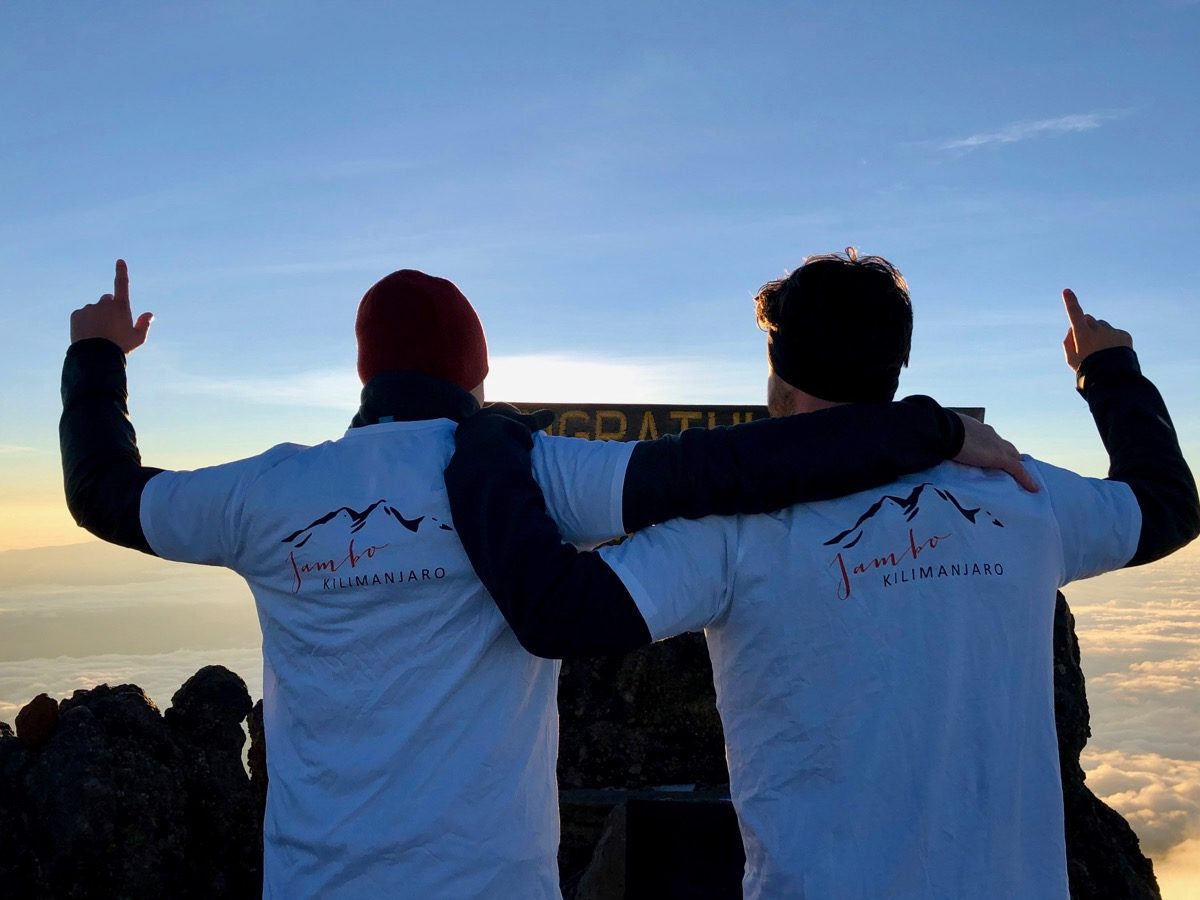
Our promise
Each of our trips is individually planned based on our experience and your wishes. Authentic and sustainable travel is especially important to us.
We therefore do not sell anything that we have not experienced ourselves and found to be good. We convince ourselves firsthand in order to make an unforgettable adventure in the heart of Africa possible for you.
Here you can see what our journey to the roof of Africa looked like.
The following services are included in the price
Optional extras available at a surcharge:
- Transfer from and to the airport
- Sleepings bags for low temperatures
- Self-inflatable mattresses (additional to the basic mattress)
- Foldable travel bed inc. porter
- Portable toilet inc. toilet tent, toilet roll, cleaning chemicals and porter
- Walking poles
- Additional oxygen cylinder package
- Overnight stay at Crater Camp
- Additional clothes and equipment on request
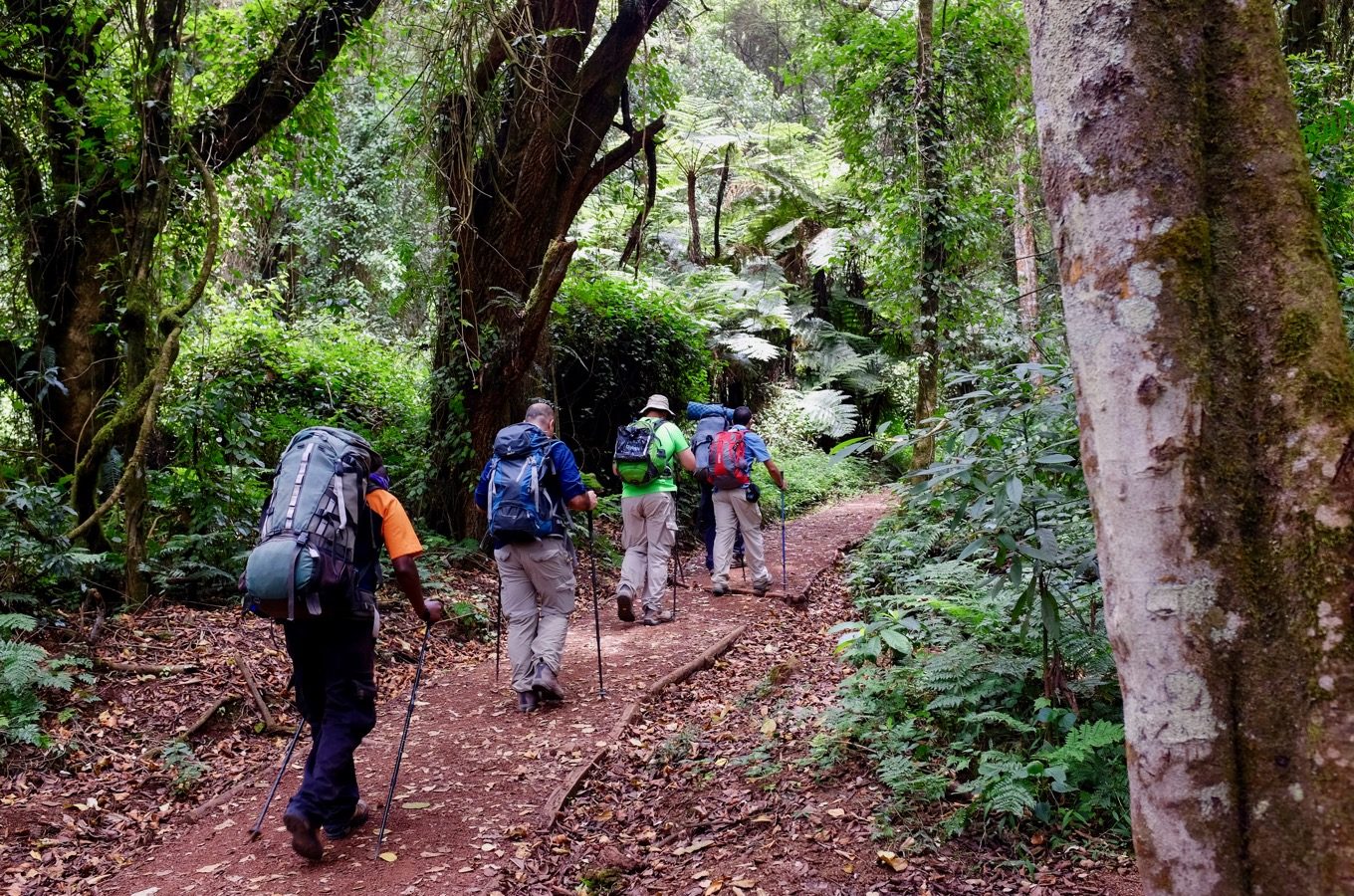
7- or 8-day ascent of Mount Kilimanjaro
Lemosho Route is the longest and most varied route for tourists up to Uhuru Peak and offers fascinating views of the country over and over. You can choose between a shorter (7 days) and longer (8 days) ascent. You will spend a total of 9 or 10 days in Tanzania, respectively. Here you can book this route as a group tour:
All our trips tested under the guidelines of the Kilimanjaro Porters Assistance Project (KPAP) with regard to payment and equipment of porters and mountain teams.
The exploitation and mistreatment of porters can be a troubling challenge in the climbing industry. By climbing with us – a qualified KPAP Partner company – you can be assured that your porters are well taken care of. All Kilimanjaro companies are invited to participate with the Partner for Responsible Travel Program. We voluntarily cooperate with KPAP’s monitoring activities and allow KPAP to evaluate the treatment of our porters on all our climbs.
We are proud to be an approved Partner company as this ensures we are providing a fair salary to our porters, paying salaries on time, fair load weights, 3 meals a day on the mountain, proper shelter and equipment, policies to care for sick or injured porters on duty and more to ensure a happy, healthy and great support team for each trek.
The Kilimanjaro Porters Assistance Project (KPAP) is a Tanzanian non-for-profit organization founded in 2003. KPAP is an initiative of the International Mountain Explorers Connection (IMEC), a US 501(c)3 nonprofit organization. You can find out more and donate at www.kiliporters.org.
